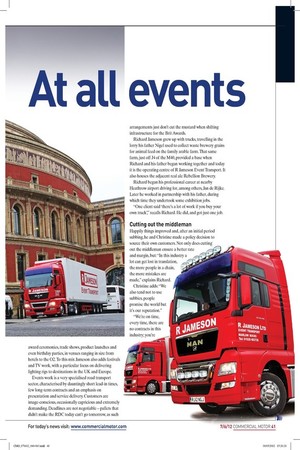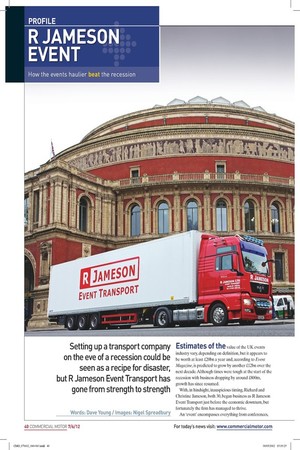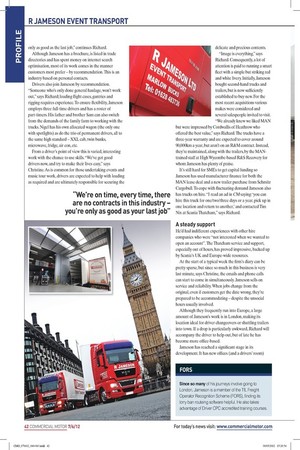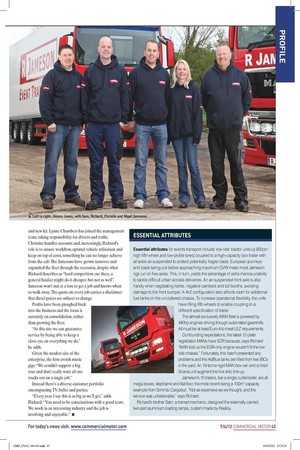At all events
Page 33

Page 32

Page 34

Page 35

If you've noticed an error in this article please click here to report it so we can fix it.
Setting up a transport company on the eve of a recession could be seen as a recipe for disaster, but R Jameson Event Transport has gone from strength to strength
Estimates of the value of the UK events industry vary, depending on definition, but it appears to be worth at least £20bn a year and, according to Event Magazine, is predicted to grow by another £12bn over the next decade. Although times were tough at the start of the recession with business dropping by around £800m, growth has since resumed.
With, in hindsight, inauspicious timing, Richard and Christine Jameson, both 30, began business as R Jameson Event Transport just before the economic downturn, but fortunately the firm has managed to thrive.
An ‘event’ encompasses everything from conferences, award ceremonies, trade shows, product launches and even birthday parties, in venues ranging in size from hotels to the O2. To this mix Jameson also adds festivals and TV work, with a particular focus on delivering lighting rigs to destinations in the UK and Europe.
Events work is a very specialised road transport sector, characterised by dauntingly short lead-in times, few long-term contracts and an emphasis on presentation and service delivery. Customers are image-conscious, occasionally capricious and extremely demanding. Deadlines are not negotiable – pallets that didn’t make the RDC today can’t go tomorrow, as such arrangements just don’t cut the mustard when shifting infrastructure for the Brit Awards.
Richard Jameson grew up with trucks, travelling in the lorry his father Nigel used to collect waste brewery grains for animal feed on the family arable farm. That same farm, just off J4 of the M40, provided a base when Richard and his father began working together and today it is the operating centre of R Jameson Event Transport. It also houses the adjacent real ale Rebellion Brewery.
Richard began his professional career at nearby Heathrow airport driving for, among others, Jan de Rijke. Later he worked in partnership with his father, during which time they undertook some exhibition jobs.
“One client said ‘there’s a lot of work if you buy your own truck’ , ” recalls Richard. He did, and got just one job.
Cutting out the middleman
Happily things improved and, after an initial period subbing, he and Christine made a policy decision to source their own customers. Not only does cutting out the middleman ensure a better rate and margin, but: “In this industry a lot can get lost in translation, the more people in a chain, the more mistakes are made,” explains Richard.
Christine adds: “We also tend not to use subbies, people promise the world but it’s our reputation.” “We’re on time, every time, there are no contracts in this industry; you’re only as good as the last job,” continues Richard.
Although Jameson has a brochure, is listed in trade directories and has spent money on internet search optimisation, most of its work comes in the manner customers most prefer – by recommendation. This is an industry based on personal contacts.
Drivers also join Jameson by recommendation. “Someone who’s only done general haulage, won’t work out,” says Richard; loading flight cases, gantries and rigging requires experience. To ensure flexibility, Jameson employs three full-time drivers and has a roster of part-timers. His father and brother Sam can also switch from the demands of the family farm to working with the trucks. Nigel has his own allocated wagon (the only one with spotlights) as do the trio of permanent drivers, all to the same high standard – XXL cab, twin bunks, microwave, fridge, air con, etc.
From a driver’s point of view this is varied, interesting work with the chance to use skills. “We’ve got good drivers now, and try to make their lives easy,” says Christine. As is common for those undertaking events and music tour work, drivers are expected to help with loading as required and are ultimately responsible for securing the delicate and precious contents.
“Image is everything,” says Richard. Consequently, a lot of attention is paid to running a smart fleet with a simple but striking red and white livery. Initially, Jameson bought second-hand trucks and trailers, but is now sufficiently established to buy new. For the most recent acquisitions various makes were considered and several salespeople invited to visit. “We already knew we liked MAN but were impressed by Cordwallis of Heathrow who offered the best value,” says Richard. The trucks have a three-year warranty and are expected to cover around 90,000km a year, but aren’t on an R&M contract. Instead, they’re maintained, along with the trailers, by the MANtrained staff at High Wycombe-based R&S Recovery for whom Jameson has plenty of praise.
It’s still hard for SMEs to get capital funding so Jameson has used manufacturer finance for both the MAN lease deal and a new trailer purchase from Schmitz Cargobull. To cope with fluctuating demand Jameson also has trucks on hire. “I read an ad in CM saying: ‘you can hire this truck for one/two/three days or a year, pick up in one location and return to another,’ and contacted Tim Nix at Scania Thatcham,” says Richard.
A steady support
He’d had indifferent experiences with other hire companies who were “not interested when we wanted to open an account” . The Thatcham service and support, especially out of hours, has proved impressive, backed up by Scania’s UK and Europe-wide resources.
At the start of a typical week the firm’s diary can be pretty sparse, but since so much in this business is very last minute, says Christine, the emails and phone calls can start to come in simultaneously. Jameson sells on service and reliability. When jobs change from the original, even if customers get the date wrong, they’re prepared to be accommodating – despite the unsocial hours usually involved.
Although they frequently run into Europe, a large amount of Jameson’s work is in London, making its location ideal for driver changeovers or shuttling trailers into town. If a drop is particularly awkward, Richard will accompany the driver to help out, but of late he has become more office-based.
Jameson has reached a significant stage in its development. It has new offices (and a drivers’ room) and new kit. Lynne Chambers has joined the management team, taking responsibility for drivers and traffic. Christine handles accounts and, increasingly, Richard’s role is to ensure workflow, optimal vehicle utilisation and keep on top of costs, something he can no longer achieve from the cab. The Jamesons have grown turnover and expanded the fleet through the recession, despite what Richard describes as “hard competition out there, a general haulier might do it cheaper, but not as well” . Jameson won’t run at a loss to get a job and knows when to walk away. The quote on every job carries a disclaimer that diesel prices are subject to change.
Profits have been ploughed back into the business and the focus is currently on consolidation, rather than growing the fleet.
“At this size we can guarantee service by being able to keep a close eye on everything we do,” he adds.
Given the modest size of the enterprise, the firm avoids music gigs: “We couldn’t support a big tour and don’t really want all our trucks out on a single job.” Instead there’s a diverse customer portfolio encompassing TV, ballet and parties.
“Every year I say this is as big as we’ll get,” adds Richard. “You need to be conscientious with a good team. We work in an interesting industry and the job is involving and enjoyable.” n
FORS
Since so many of his journeys involve going to London, Jameson is a member of the TfL Freight Operator Recognition Scheme (FORS), finding its lorry ban routeing software helpful. He also takes advantage of Driver CPC accredited training courses.
ESSENTIAL ATTRIBUTES
Essential attributes for events transport include ‘low ride’ tractor units (a 900cm high fifth-wheel and low-profile tyres) coupled to a high-capacity box trailer with all axles air-suspended to protect potentially fragile loads. European journeys and loads taring out before approaching maximum GVW mean most Jameson rigs run on five axles. This, in turn, yields the advantage of extra manoeuvrability to tackle difficult urban access deliveries. An air-suspended front axle is also handy when negotiating kerbs, negative cambers and toll booths, avoiding damage to the front bumper. A 4x2 configuration also affords room for additional fuel tanks on the uncluttered chassis. To increase operational flexibility, the units have lifting fifth-wheels to enable coupling to a different specification of trailer.
The almost exclusively MAN fleet is powered by 440hp engines driving through automated gearshifts. All must be at least Euro-4 to meet LEZ requirements.
Confounding expectations, the latest 12-plate registration MANs have SCR because, says Richard: “MAN told us the EGR-only engine wouldn’t fit the low ride chassis.” Fortunately, this hasn’t presented any problems and the AdBlue tanks are filled from two IBCs in the yard. An 18-tonne rigid MAN box van and a hired Scania unit augment the five artic line-up.
Jameson’s 10 trailers, bar a single curtainsider, are all mega boxes, stepframe and flat floor, the most recent being a 100m3 capacity example from Schmitz Cargobull. “Not as expensive as we thought, and the service was unbelievable,” says Richard.
Richard’s brother Sam, a trained mechanic, designed the externally carried, two-part aluminium loading ramps, custom made by Raalloy.











































